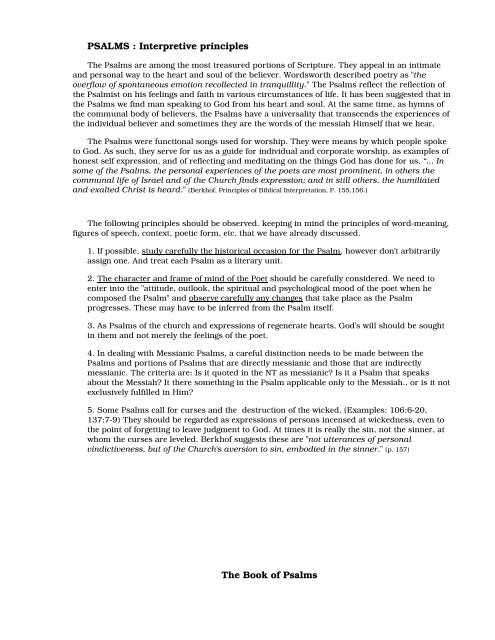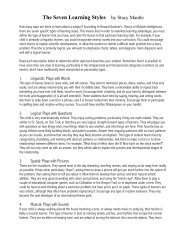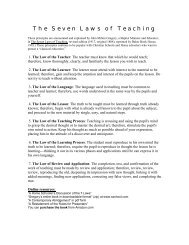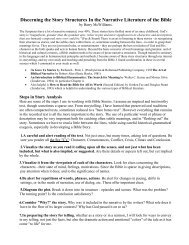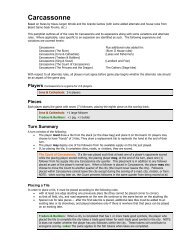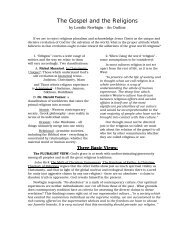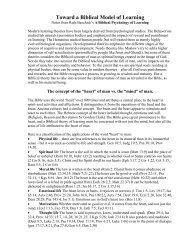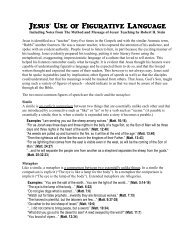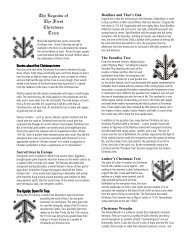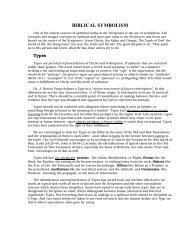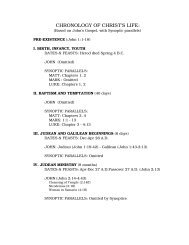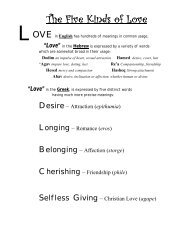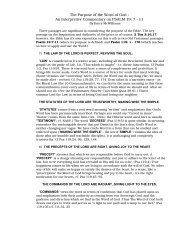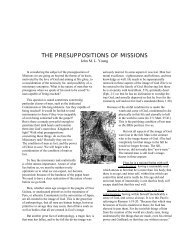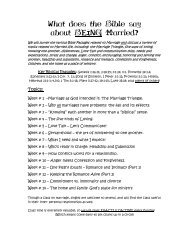PSALMS : Interpretive principles The Book of Psalms
PSALMS : Interpretive principles The Book of Psalms
PSALMS : Interpretive principles The Book of Psalms
Create successful ePaper yourself
Turn your PDF publications into a flip-book with our unique Google optimized e-Paper software.
<strong>PSALMS</strong> : <strong>Interpretive</strong> <strong>principles</strong><br />
<strong>The</strong> <strong>Psalms</strong> are among the most treasured portions <strong>of</strong> Scripture. <strong>The</strong>y appeal in an intimate<br />
and personal way to the heart and soul <strong>of</strong> the believer. Wordsworth described poetry as "the<br />
overflow <strong>of</strong> spontaneous emotion recollected in tranquillity." <strong>The</strong> <strong>Psalms</strong> reflect the reflection <strong>of</strong><br />
the Psalmist on his feelings and faith in various circumstances <strong>of</strong> life. It has been suggested that in<br />
the <strong>Psalms</strong> we find man speaking to God from his heart and soul. At the same time, as hymns <strong>of</strong><br />
the communal body <strong>of</strong> believers, the <strong>Psalms</strong> have a universality that transcends the experiences <strong>of</strong><br />
the individual believer and sometimes they are the words <strong>of</strong> the messiah Himself that we hear.<br />
<strong>The</strong> <strong>Psalms</strong> were functional songs used for worship. <strong>The</strong>y were means by which people spoke<br />
to God. As such, they serve for us as a guide for individual and corporate worship, as examples <strong>of</strong><br />
honest self expression, and <strong>of</strong> reflecting and meditating on the things God has done for us. “... In<br />
some <strong>of</strong> the <strong>Psalms</strong>, the personal experiences <strong>of</strong> the poets are most prominent, in others the<br />
communal life <strong>of</strong> Israel and <strong>of</strong> the Church finds expression; and in still others, the humiliated<br />
and exalted Christ is heard." (Berkh<strong>of</strong>, Principles <strong>of</strong> Biblical Interpretation, P. 155,156.)<br />
<strong>The</strong> following <strong>principles</strong> should be observed. keeping in mind the <strong>principles</strong> <strong>of</strong> word-meaning,<br />
figures <strong>of</strong> speech, context, poetic form, etc. that we have already discussed.<br />
1. If possible, study carefully the historical occasion for the Psalm, however don't arbitrarily<br />
assign one. And treat each Psalm as a literary unit.<br />
2. <strong>The</strong> character and frame <strong>of</strong> mind <strong>of</strong> the Poet should be carefully considered. We need to<br />
enter into the "attitude, outlook, the spiritual and psychological mood <strong>of</strong> the poet when he<br />
composed the Psalm" and observe carefully any changes that take place as the Psalm<br />
progresses. <strong>The</strong>se may have to be inferred from the Psalm itself.<br />
3. As <strong>Psalms</strong> <strong>of</strong> the church and expressions <strong>of</strong> regenerate hearts, God's will should be sought<br />
in them and not merely the feelings <strong>of</strong> the poet.<br />
4. In dealing with Messianic <strong>Psalms</strong>, a careful distinction needs to be made between the<br />
<strong>Psalms</strong> and portions <strong>of</strong> <strong>Psalms</strong> that are directly messianic and those that are indirectly<br />
messianic. <strong>The</strong> criteria are: Is it quoted in the NT as messianic? Is it a Psalm that speaks<br />
about the Messiah? It there something in the Psalm applicable only to the Messiah., or is it not<br />
exclusively fulfilled in Him?<br />
5. Some <strong>Psalms</strong> call for curses and the destruction <strong>of</strong> the wicked. (Examples: 106:6-20,<br />
137:7-9) <strong>The</strong>y should be regarded as expressions <strong>of</strong> persons incensed at wickedness, even to<br />
the point <strong>of</strong> forgetting to leave judgment to God. At times it is really the sin, not the sinner, at<br />
whom the curses are leveled. Berkh<strong>of</strong> suggests these are "not utterances <strong>of</strong> personal<br />
vindictiveness, but <strong>of</strong> the Church's aversion to sin, embodied in the sinner." (p. 157)<br />
<strong>The</strong> <strong>Book</strong> <strong>of</strong> <strong>Psalms</strong>
<strong>The</strong> Psalter has been divided into five books: <strong>Book</strong> 1: <strong>Psalms</strong> 1 - 41; <strong>Book</strong> 2: <strong>Psalms</strong> 42 - 72;<br />
<strong>Book</strong> 3: <strong>Psalms</strong> 73 - 89; <strong>Book</strong> 4: <strong>Psalms</strong> 90 - 106; and <strong>Book</strong> 5: <strong>Psalms</strong> 107 - 150. Within these<br />
groupings are a number <strong>of</strong> sub-categories. Each ends with a doxology.<br />
Authors: David: 73 - about half, mostly in <strong>Book</strong>s 1 and 2, Moses 1, Solomon 2, the sons <strong>of</strong><br />
Asaph 12, and by the sons <strong>of</strong> Korah 10, many psalms have no indication <strong>of</strong> authorship.<br />
While the "five" books <strong>of</strong> the Psalter are not categorically arranged, we can take note <strong>of</strong> the<br />
following classifications, noting some overlap in them:<br />
• Prayers related to troubled circumstances and faith and trust (about half <strong>of</strong> the <strong>Psalms</strong>) in<br />
particular - 11, 16, 23, 27, 62, 63, 91, 121, 125, 131<br />
• Laments (about sixty, including: individual - 3, 22, 31, 39, 42, 57, 71, 120; and corporate<br />
laments - 12, 44, 80, 94, 137. <strong>The</strong>se have six elements: address, complaint, trust, deliverance,<br />
assurance and praise,<br />
• <strong>Psalms</strong> <strong>of</strong> Praise (about forty incl. the Hallels - 136, 146-50)- these can be grouped as<br />
individual or corporate); Of God the Creator - 8, 19, 148; <strong>of</strong> God the Protector - 66, 100, 111,<br />
114, 149; Lord <strong>of</strong> History - 33, 103, 113, 117, 145-147.<br />
• <strong>Psalms</strong> <strong>of</strong> the Righteous man - l, l5, 101, 1l2, l33<br />
• Royal <strong>Psalms</strong> - 2, 18, 20, 21, 45, 72, 101, 110, 132, 144; Enthronement - 24, 29, 47, 93, 95-<br />
99<br />
• Penitential - 32, 51<br />
• Historical - 78, 81, 105, 106 - Salvation History 78, 105, 106, 135, 136<br />
• Alphabetic (Acrostic, uses the Hebrew alphabet <strong>of</strong> 22 letters) - 119, 25, 34, 37, 111, 112, 145<br />
• Ascent <strong>The</strong>se songs were sung by those on pilgrimage up to Jerusalem - 120-134.<br />
• Thanksgiving Individual - 18, 30, 32, 34, 40, 66, 92, 116, 118, 138; and Community - 65,<br />
67, 75, 107, 124, 136. <strong>The</strong>ir elements: Introduction, distress, appeal, deliverance, and<br />
testimony.<br />
• Celebration and Affirmation - Covenant renewal - 50, 81; Davidic Covenant - 89, 132<br />
• Songs <strong>of</strong> Zion (Jerusalem) - 46, 48, 76, 84, 87, 122<br />
• Messianic <strong>Psalms</strong>: 2, 16, 99, 40, 45, 69, 110, 72, and 89 are Messianic, the N.T. also quotes<br />
8, 4, 68, 102, 109 and 118, which have indirect Messianic references.<br />
• Wisdom <strong>Psalms</strong> - 1, 19b, 32, 34, 37, 49, 78, 111, 112, 119, 127, 128, 133 (Cf Prov 8)<br />
For more on their organization see Out <strong>of</strong> <strong>The</strong> Depths: <strong>The</strong> <strong>Psalms</strong> Speak for Us Today by<br />
Bernard Anderson. Among the best commentaries on the <strong>Psalms</strong> are Calvin’s Commentary on<br />
<strong>Psalms</strong> and Charles Spurgeon’s A Treasury <strong>of</strong> David.


